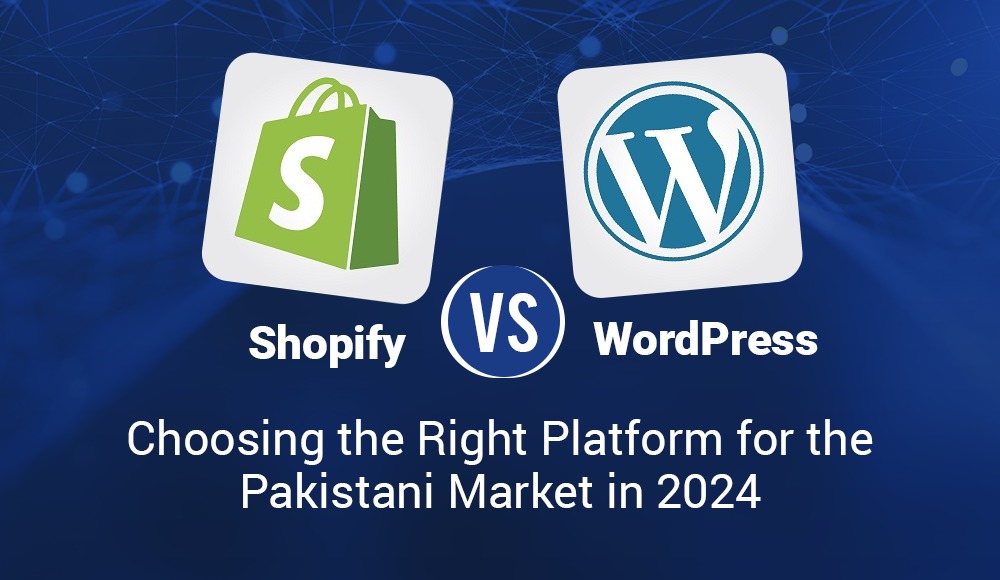In the ever-expanding landscape of e-commerce, choosing the right platform is crucial for businesses aiming to establish a strong online presence. In Pakistan, where digital commerce is on the rise, selecting between Shopify and WordPress is a pivotal decision. By examining various factors such as ease of use, customization options, e-commerce features, scalability, cost, and support, businesses can make informed choices tailored to their specific needs and objectives.

Ease of Use:
Shopify: Renowned for its user-friendly interface and straightforward setup process, Shopify is an excellent choice for beginners and those with limited technical expertise. Its intuitive dashboard allows users to manage products, orders, and payments with ease, requiring minimal configuration.
WordPress: While WordPress offers a user-friendly interface, setting up e-commerce functionality using plugins like WooCommerce may require a bit more technical know-how. However, with its extensive documentation and community support, even novices can navigate WordPress effectively.
Customization and Flexibility:
Shopify: Offers a plethora of customizable themes and apps through the Shopify App Store, allowing businesses to personalize their online stores to align with their branding and aesthetic preferences. However, customization options may be somewhat limited compared to WordPress.
WordPress: Renowned for its unparalleled flexibility and customization capabilities, WordPress allows businesses to create highly tailored websites using a vast array of plugins and themes. With plugins like WooCommerce, businesses can customize every aspect of their online stores to meet their unique requirements.
E-commerce Features :
Shopify: Tailored specifically for e-commerce, Shopify offers a comprehensive suite of features, including product management, inventory tracking, secure payments, and order fulfillment. Its built-in functionalities streamline the entire sales process, making it ideal for businesses focused primarily on selling products online.
WordPress: With plugins like WooCommerce, WordPress can transform into a powerful e-commerce platform, offering features comparable to Shopify. From customizable product pages to flexible shipping options and advanced analytics, WooCommerce empowers businesses to create robust online stores tailored to their needs.
Scalability:
Shopify: Designed to scale seamlessly as businesses grow, Shopify can accommodate high levels of traffic and expand product catalogs without sacrificing performance. Its cloud-based infrastructure ensures reliability and scalability, making it an ideal choice for businesses with ambitious growth plans.
WordPress: With proper optimization and hosting, WordPress websites can also scale effectively to meet growing demands. However, managing scalability may require more manual configuration compared to Shopify, particularly in terms of server resources and caching mechanisms.
Cost:
Shopify: While Shopify offers various pricing plans to suit different budgets, additional costs may arise from premium themes, apps, and transaction fees. Businesses should consider their specific needs and budget constraints when choosing a Shopify plan and factoring in additional expenses.
WordPress: WordPress itself is free to use, but businesses will incur costs for domain registration, hosting, premium themes, and plugins like WooCommerce. While WordPress offers more flexibility in terms of cost management, businesses should budget for ongoing expenses such as hosting renewals and plugin updates.
Support and Maintenance:
Shopify: Provides dedicated customer support and regular updates to ensure security and performance. Businesses can rely on Shopify’s support team for assistance with technical issues and access a wealth of resources, including documentation and forums, for self-help.
WordPress: Support options for WordPress vary depending on the hosting provider, theme developers, and plugin creators. While WordPress has a vast community and extensive documentation available online, businesses may need to invest in premium support services for personalized assistance.
In conclusion, both Shopify and WordPress offer compelling solutions for businesses in the Pakistani market seeking to establish or expand their online presence. While Shopify excels in ease of use, e-commerce features, and scalability, WordPress provides unparalleled customization options and flexibility. Ultimately, businesses should evaluate their specific requirements, technical capabilities, and long-term objectives to determine the most suitable platform for their e-commerce endeavors in 2024 and beyond.

